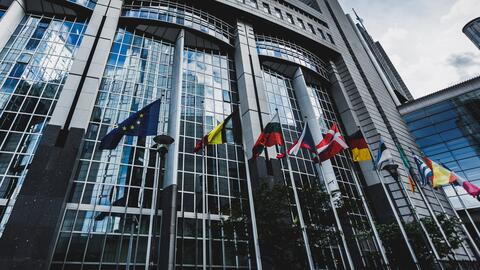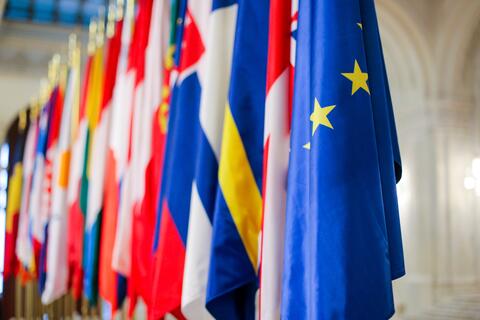European integration is a tangible reality with ramifications in our day-to-day lives, business activities and national, international and local policies. Understanding European issues is a powerful asset for a national or international career in a range of settings, including public and parapublic entities, businesses, non-profits and lobby groups.

The Master in Europe and Global Affairsat Sciences Po Rennes, led jointly with the University of Rennes, prepares professionals for a career in any role that requires a strong background in European affairs and a broad grasp of how Europe works, its institutions and its tangible effects on national public policy, business and various stakeholders, including NGOs and non-profits. It offers in-depth learning on topics related to European governance and current European affairs, like digital Europe, economic governance, building a Europe of culture, migration and security issues.
An inside understanding of the European Union has never been more important or useful. This Master’s program is unique in the attention it pays to the role of the Union in its neighboring environment and the world. This attention is more than simple theory: Brexit, the refugee crisis and the future of EU/China relations demonstrate how the European Union on the international scene effects day-to-day affairs.
The program therefore offers a double focus on Europe and the world, vital in a context where global, European and local issues are intrinsically connected. This unique feature of the degree sets it apart from other programs.
This program offers a full course schedule running from September to June. The curriculum is multi-disciplinary (law, political science and economics), professionally-oriented (numerous professionals participate, emphasis on practical exercises, simulations and case studies) and multilingual (courses in French and sometimes in English).
Classes are organized around three fundamental topics, represented by teaching units (UE). Students take a set of courses focusing on the governance of the European Union (UE1), the purpose of which is to emphasize the institutional workings of the European Union, a sound knowledge of which is an essential prerequisite for anyone wishing to work in the private or public sectors.
The second part of the courses (UE2), which focuses on contemporary integration issues, is designed to raise participants' awareness of the current global issues affecting the European Union (e.g. the eurozone crisis, migration policy, Brexit, energy policy, digital issues, etc.).
The last topic is about the role of the EU as a global player, which tends to discuss topics related to the relationship between the EU and the rest of the world (EU trade policy and agreements, WTO and free trade agreements, neighborhood policy, Euro-Turkish relations, EU/China, etc.).
A study trip to Brussels, Belgium is organized in the first semester.
The program is completed by an internship in the public or private sector. The students will then submit a report on their internship, written in collaboration with a professional and a professor.
UE1: Governance in the European Union
- European decision-making
- Negotiation and decision-making in the European Union: simulation game (6H)
- Europe and its regions (Europeanization of regional policies, European dimension of regional policies)
- European project simulation (demonstrating how European funding works)
- European social policy
- Political economy of the European Union
- Latest developments in Economic and Monetary Union
- Competition policy
UE2: Contemporary issues in European integration
- The media and Europe
- Euroscepticism and opposition and European integration
- Thinking about one another in the European Union
- News about the Brexit
- Europe and the environmental and climate challenge
- EU migration policy
- Europe under construction (48h)
- Digital Europe
- Building a cultural policy
- Energy in Europe
- Changes in agricultural policy
UE3: Europe in the world
- The European Union and its neighborhoods
- EU-Turkey relations
- Europe and the sea
- EU trade policy
- Common security and defence policy of the EU
- The European Union and Non-State Territories
- China-EU relations
- The European External Action Service (EEAS)
UE4: Internship
- Minimum 16 weeks
First-year Master’s students (M1):
The students enrolled at Sciences Po Rennes at the Rennes or Caen campus who have successfully completed their first three years of study.
Second-year Master’s students (M2):
Degree-seeking students enrolled at Sciences Po Rennes who have successfully completed 240 ECTS credits. Students who hold a five-year post-secondary degree from another university, or similar establishment. Admission is based on an application and an interview for qualified applicants.
Continuing education students who have the equivalent of a four-year post-secondary degree, hold a professional role with executive-level operational and hierarchical responsibilities, and have at least five years of relevant experience in the subjects covered in the program. Admission is based on an application and an interview for qualified applicants.
The program can accommodate 20 students. Admission is based on an application and an interview for qualified applicants.
Master's lecturers are chosen for their recognized knowledge and skills, either in the academic or professional sector (with a target of 50% professionals).
- Frédéric Allemand, Research Fellow, Robert Schuman Institute, Faculty of Law, Economics and Finance in the University of Luxembourg
- Justin Amiot, Chief of the staff at the Region Bretagne
- Pascal Bonnard, Lecturer in political science at the University of Jean Monnet in Saint-Étienne
- Bernard Bruneteau, Professor of modern history and political science, University of Rennes
- Jean-Christophe Barbato, Professor at the University of Paris 1 Panthéon-Sorbonne
- Maurice de Langlois, General officer, Saint-Cyrien, specialist in security and defence for NATO and the European Union
- Alice Eckman, head of China activities at the Asia Centre of the French Institute of International Relations
- Patrick Faucheur, Counsellor at the General Secretariat for European Affairs (SGAE)
- Anja Fiedler, civil servant at the European External Action Service
- Thibaut Fleury Graff, Professor at the University of Rennes
- Alan Hervé, Professor at Sciences Po Rennes, European Chair Jean Monnet, Head of the master Europe and Global Affairs
- Catherine Laroche-Dupraz, Teacher – researcher in agriculture policy, Professor at the Agrocampus Ouest
- Élise Latify, Consultant in protection of the personal data
- Marion Lemoine, Research fellow at the CNRS
- Agnès Leroux, EU Public Affairs Director, Acumen Public Affairs
- Tobias Schumacher, Professor at the College of Europe, Holder of the Neighbourhood Chair at the College of Europe, Warsaw
- Frédérique Michea, Lecturer at the University of Rennes
- Yves Pascouau, Head of the program "Migration and diversity", Senior associate researcher at the Institute Jacques Delors
- Romain Pasquier, Director of research at the CNRS, at laboratoire Arènes
- Damien Périssé, Director, Marine affairs, Conference of Peripheral Maritime Regions (CPRM)
- Émilie Magdalinski, Researcher at the Institute Jacques Delors
- Jean-François Polo, Lecturer at Sciences Po Rennes
- Audrey Roncigli, Assistant to the Special Counsellor in the General Secretariat for European Affairs, responsible for negotiating BREXIT.
- Jan Szczodrowski, Member of the European Commission Legal Service (responsible for competition policy), Brussels
- Claire Visier, Lecturer at the University of Rennes






